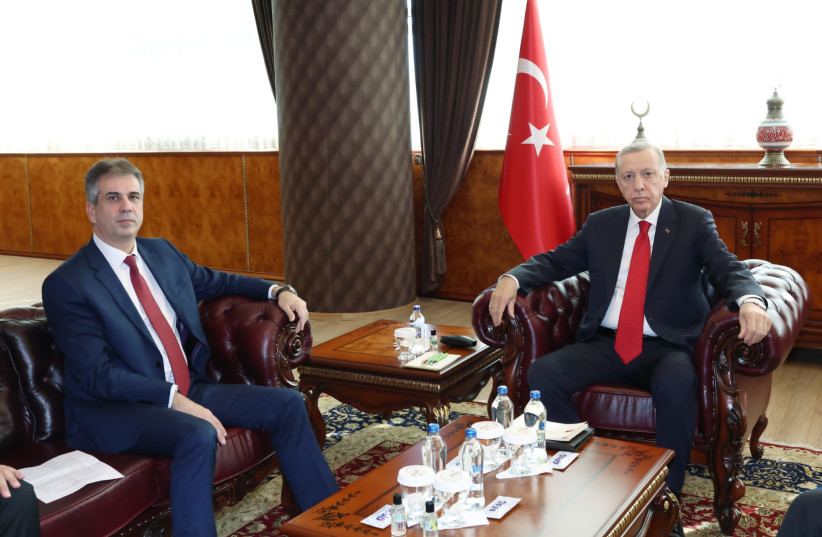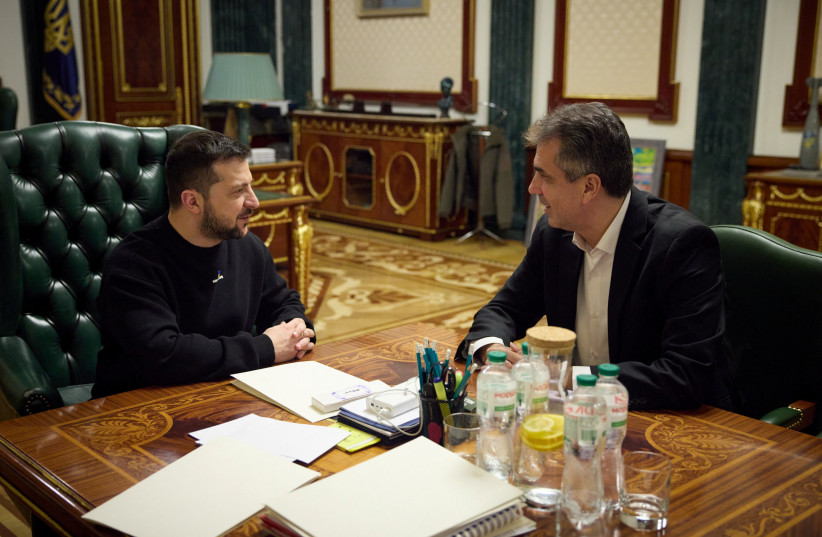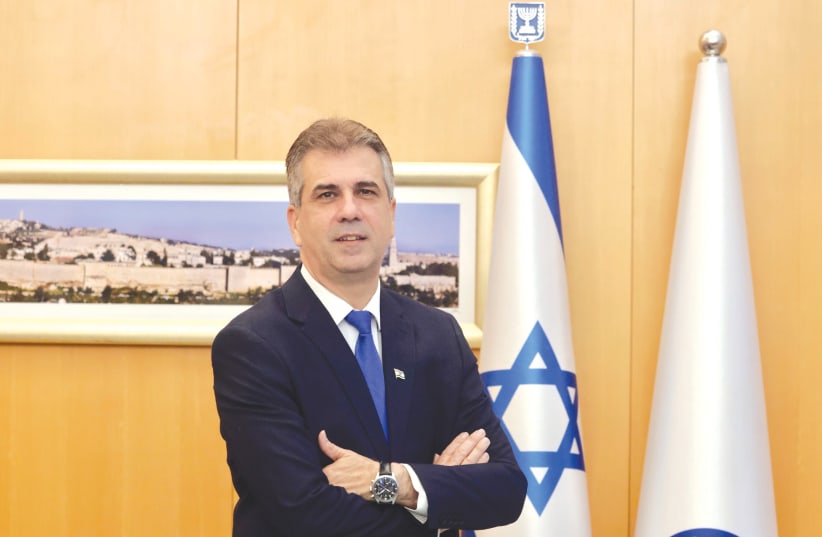In five months on the job, Foreign Minister Eli Cohen has racked up a long list of international visits – Kyiv, Delhi, Brussels, Ankara, Stockholm, even Ashgabat, the capital of Turkmenistan – ensured flights to and from Israel would be allowed in Oman’s airspace, made progress on peace with Sudan, completed a free-trade agreement with the United Arab Emirates, and more.
Cohen is working at the pace of a man who is running out of time – because he is. One of the arrangements Prime Minister Benjamin Netanyahu made to placate his warring Likud ministers is for Cohen to be foreign minister for one year, and then be replaced by Israel Katz, who would be returning to the post he held in 2019-2020.
“My motto as foreign minister is to bring as many breakthroughs as possible,” Cohen said in his office this week. “I want to do things that haven’t been done before.”
One area in which he’s seeking those breakthroughs is further normalization with the Arab and Muslim world. He was able to dive into that work because, as intelligence minister when the Abraham Accords were signed, he was a key figure pushing for relations between Israel and Sudan, as well as other Muslim countries in Africa and Asia.
Regarding normalization with Saudi Arabia, which Netanyahu said is a priority, Cohen said “it’s not a matter of if, but of when. We and Saudi Arabia have the same interests.”


The recent renormalization between Riyadh and Tehran is not an obstacle, Cohen said, because it is “a façade.”
“Iran is Saudi Arabia’s No. 1 enemy... Saudi Arabia would do anything to stop them from getting a nuclear weapon. The agreement was the Saudis’ way of sending a message to the Americans to get more involved,” he said.
Senior Biden administration figures and US Sen. Lindsey Graham spoke to Saudi Crown Prince Mohammed bin Salman about peace with Israel recently, Cohen said.
Riyadh wanted a more positive approach from Washington, and they’re getting it, the foreign minister added.
In 2020, Sudan agreed to peace with Israel, but the armed conflict between rival factions of the military government of Sudan has prevented finalizing it. Cohen flew to Sudan in February, after visiting as intelligence minister, met with Sudanese Gen. Abdel Fattah al-Burhan, and returned with a draft peace agreement.
“I hope talks in Riyadh will bring calm to Sudan,” Cohen said. “The US and UAE are involved, and no one wants to see Sudan backslide to become a base for terrorism. It’s important for us. Sudan fought in two wars against Israel... and was a central base for smuggling from Iran to Gaza.”
Cohen promised more agreements are on the way, citing target countries like Niger, Mauritania, Somalia, Djibouti, Malaysia and Indonesia.
“I hope Israelis will be able to visit Bali a lot more easily. Tens of thousands of Indonesians, mostly Christians, visit us each year,” he said.
The minister’s message to these countries is that “the Abraham Accords prove that it is worthwhile to make peace with Israel. We help countries economically and technologically. These countries need our aid in agriculture and water.”
Cohen also set a goal to double the number of countries with embassies to Jerusalem. There are currently four in the capital, which means he has one down – Papua New Guinea promised – and three to go.
According to Cohen, an EU member state is set to break ranks and open an embassy in Jerusalem in the coming months.
Israel's position on Ukraine-Russia war
ANOTHER BREAKTHROUGH for Cohen was in Ukraine. He was the highest-level Israeli official to visit Kyiv since Russia invaded the country last year.
“It was a very important and interesting meeting, and [Ukrainian President Volodymyr] Zelensky wrote a post that he was very satisfied with the ties between Ukraine and Israel,” he said.
Asked whether his visit marked a new approach, Cohen said “the last government and ours supported Ukraine in international institutions, but I think that the trip increases our identification and solidarity with Ukraine.”
However, a Ukrainian diplomatic official sharply criticized recent meetings between senior Foreign Ministry figures with their counterparts in Moscow to discuss matters relating to the Iranian threat, pointing to Russia’s use of Iranian weapons and saying “Israel has to decide if it is a part of the Western world and stands beside Ukraine, or whether it embraces the world’s dark forces. Neutrality is not an option.”


Cohen responded that “Russia is a player in the Middle East, and there are hundreds of thousands of Jews in Russia; therefore we express a moral stance of support for Ukraine while preserving our security interests and those of the Jewish Agency in Russia.
“Israel is with the Western states,” he said. “We are the only Middle Eastern country to send a foreign minister to Kyiv. That means something.
“It’s clear that we support Zelensky’s position on a peace agreement, and the sovereignty and territorial integrity of Ukraine. Israeli and Ukrainian soldiers are currently working together on installing a warning system against missiles in Ukraine.”
In meetings with European leaders, Cohen said Ukraine is at the top of their minds, before the Palestinians or judicial reform in Israel.
“This creates two opportunities for Israel,” he said. “Europe wants more energy sources, and most states in Europe are going to significantly increase their defense budgets.”
Israel is working on gas exports to Europe and is marketing its defense industry across the continent. Cohen visited Sweden this week, which is looking to join NATO and therefore must increase its defense spending from 0.4% to 2%.
Using diplomatic understatement, Cohen said he had “a lot of differences of opinion” with EU High Representative for Foreign Affairs Josep Borrell when they met this month.
“I don’t see their intervention in the Israeli-Palestinian conflict and internal Israeli matters as acceptable,” Cohen said.
Israel is happy for the EU to send humanitarian aid to the Palestinians, but construction in Area C of Judea and Samaria, which is under Israeli control, is not acceptable, the minister said. The EU condemned Israel for the recent demolition of an EU-built Palestinian school in Gush Etzion.
In addition, Cohen said Europe needs to do more to stop the Palestinian Authority from paying salaries to terrorists.
“The PA is the only place in the world that incentivizes you to murder people,” Cohen said. “If you murder someone in Israel, you go to jail. Human life is the highest value for us, the Jewish people.”
Another controversy between Israel and the EU this month was the choice of far-right National Security Minister Itamar Ben-Gvir to represent the government at a Europe Day event in Tel Aviv. The EU embassy canceled the diplomatic reception at the event, in response.
The assignment was random, Cohen said, not a slight to Europe.
However, referring to Ben-Gvir’s plan to criticize Europe in his speech, Cohen said “it’s expected of ministers going up on that stage to be statesmanlike, not represent his party or himself, but the State of Israel and the government.”
Cohen's fight for Israel's international image
COHEN IS proud of his achievements, but the images from Israel in recent months have been very different from what a foreign minister would want, with mass protests against judicial reform and cabinet ministers like Ben-Gvir making statements about Israeli-Arabs, Palestinians and LGBT people that go over poorly with Western allies.
US President Joe Biden has not invited Netanyahu to the White House because of the judicial overhaul plan. Spanish Prime Minister Pedro Sanchez gave a speech supporting the protesters, and other European leaders have expressed concern about Israeli democracy. Other government policies, such as advancing the death penalty for terrorists or reversing the disengagement from northern Samaria have resulted in a backlash.
Yet, when an internal report about judicial reform eroding Israel’s standing in the world leaked to Walla News, a Foreign Ministry spokesman said it “does not express the agreed upon position of all bodies in the ministry and does not accurately reflect the situation.”
“The report was leaked before it could be authorized by the senior figures in the ministry,” Cohen said. “That doesn’t look like a real desire to bring up the topic with me in a serious way.”
On his travels, “people often ask me what I think about the judicial reform,” Cohen admitted.
The minister, who came in second place in the Likud primary behind the reform’s champion, Justice Minister Yariv Levin, defended the plan.
“When I ask what part of the reform bothers them, no one has an answer,” he said. “The consensus in Israel is that we need a balance between the parliament and the court... I don’t think the coalition should choose judges, but I don’t think the judges should have veto power.
“I tell everyone Israel was a vibrant democracy before the reform and will be one after,” Cohen added, pointing to the protests as proof.


At the same time, Cohen said that “there are red lines you don’t cross.”
“I was in the opposition six months ago, and I never considered speaking against Israel or the Israeli economy in the world or involving the IDF, despite very difficult decisions by the previous government,” he said.
Cohen was particularly critical of former foreign minister Yair Lapid appointing Ghaida Rinawie Zoabi, then a Meretz MK, as consul-general in Shanghai. Zoabi refused to call Israel a Jewish state and would not sing “Hatikva,” sparking an uproar that ended in her remaining in Israel.
“I’m passing a law that any ambassador must recognize Israel as a Jewish and democratic state. [Appointing Zoabi], who doesn’t recognize Israel as Jewish and democratic and calls IDF soldiers derogatory names, is like making the BDS movement the face of Israel,” Cohen said.
The minister also decried Lapid’s appointment of Israeli actress turned advocate Noa Tishby as an envoy against antisemitism, saying that “she got her job because Lapid knows her.”
Cohen sacked Tishby after she publicly criticized the judicial reform plan.
“Noa Tishby can’t be in a professional position in the Foreign Ministry and speak politically. You’re either political or you work for the government. She wanted both.... I think it’s appropriate that, like others, if you don’t agree with this government, you quit,” Cohen said.
The minister denied going after Lapid appointees, pointing to Ambassador to the UAE Amir Hayek as someone who is “behaving the right way and continuing to work.” Ambassador to Canada Ronen Hoffman is another Lapid appointee who has not spoken out and has remained at his post, while former consul-general in New York Asaf Zamir and ambassador to France Yael German resigned in protest.
Cohen dodged a question about appointments Netanyahu reportedly considered whose appropriateness were widely questioned, like firebrand Likud MK May Golan to replace Zamir, saying: “I come from the business world, and I believe in results. Our results in the last four months were better than in the last four years.”
Netanyahu also appointed former ambassador to the US Ron Dermer as strategic affairs minister, with a special focus on the US-Israel relationship and the Iranian threat. Cohen does not view the appointment as undermining him or the Foreign Ministry. The minister said he talks to US Secretary of State Antony Blinken and US National Security Advisor Jake Sullivan frequently.
“Dermer is a wonderful appointment,” Cohen said. “He has a great understanding of the US. I think the prime minister did the right thing, and you can’t replace the Foreign Ministry and our 180 embassies and consulates.
“I have political power because I am No. 2 in Likud. I work in excellent cooperation with Dermer and seek his advice often. I think he has a strategic outlook,” he said.
Dermer is not an MK and did not run in the Likud primary.
